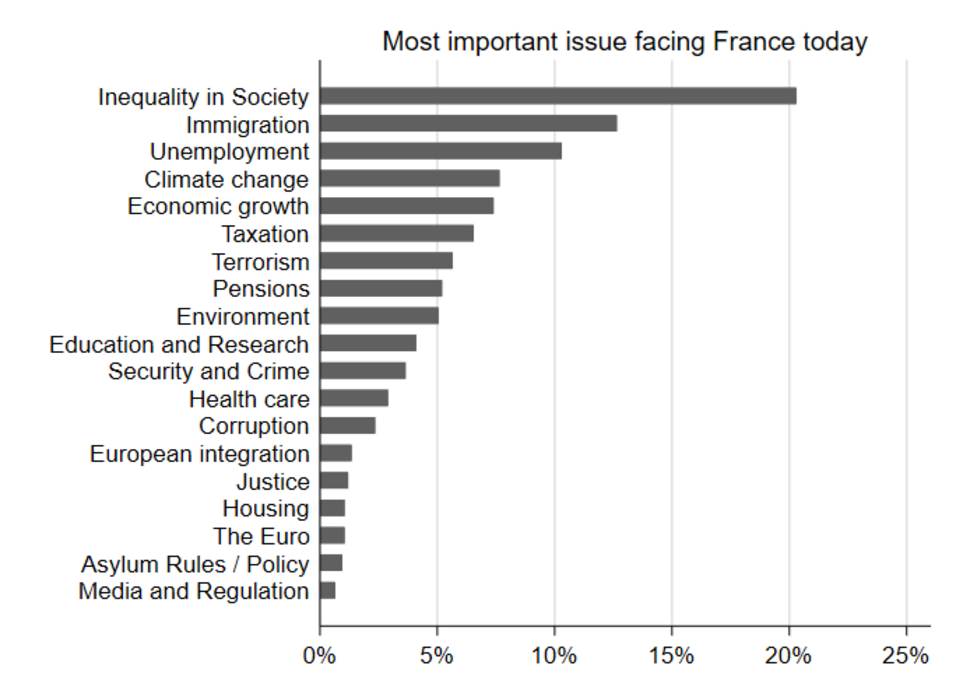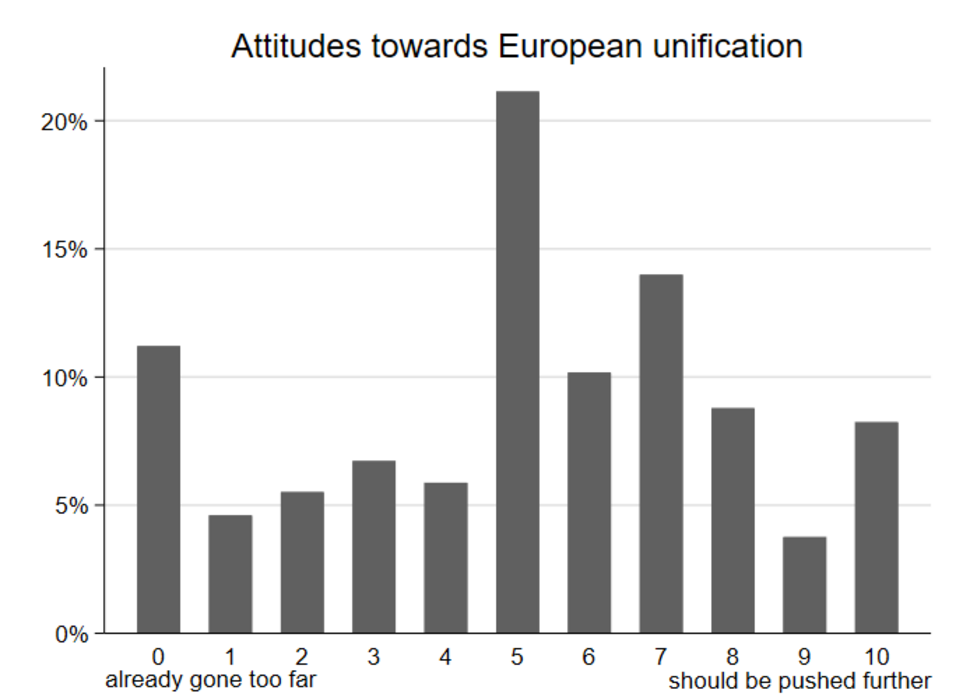by Julien Navarro and Tanja Schüberl
A rather national campaign with a European dimension
Prior to the EP election campaign, public opinion in France has largely been overshadowed by the so-called “gilets jaunes” (yellow vest) movement. In the six months leading up to the EP election, these protests, which have taken place across the country every Saturday since mid-November, have attracted more media and political attention than any other event, including the EP elections. So much so that, from mid-January until mid-March, President Macron and the French government devoted their attention to the “grand débat national”, a series of public meetings and popular consultations throughout France. It was only at the end of April – after Macron’s press conference on the conclusion of these meetings – that attention finally shifted and the EP elections received a significant amount of media coverage.
In the meantime, French parties had nominated their candidates, and in particular their lead candidate. In general, these nominations were widely commented on in the French press given that, due to their closed-list nature, the nominations usually hint at the parties’ campaign strategies and eventual Members of the European Parliament (MEPs). The nomination of little-known and young top candidates was generally interpreted as an attempt by the parties to renew their image. Yet, it was not until the nomination of Nathalie Loiseau as the lead-candidate of the presidential party “La République En Marche!” (LREM) at the end of March that the election campaign really started.
Apart from the party nomination process, the French media have devoted some focus to the lack of popular interest for the EP elections. In a kind of self-fulfilling prophecy, the media regularly laments the absence of real debates and the prospect of low turnout on Election Day. With 34 competing lists, it is indeed difficult to organize any real debate among the candidates. Televised debates have so far been described as boring and lacking in substance. In fact, the campaign is dominated by the race for first place between the two frontrunners: the far-right Rassemblement National (RN) and LREM, which have been neck-and-neck in the opinion polls since the beginning of the year. This dynamic was emphasized by the RN’s strategy to establish itself as the main opponent to Macron and his government, and the latter’s strategy to appear as the only credible shield against populism.
Nonetheless, a European dimension is not totally absent from the campaign. So far, European issues were discussed in terms of the capacity of French parties to build new alliances in the next European Parliament. This is particularly difficult for LREM, which tried to distance itself from its most natural ally, the Alliance of Liberals and Democrats (ALDE), with the aim of establishing a broader political coalition supporting Macron’s EU reform proposals. On the other hand, Marine Le Pen’s RN has been actively seeking to deepen its ties with anti-EU far-right leaders such as Victor Orbán and Matteo Salvini. Moreover, the Socialists (PS) are trying to capitalize on the recent success of the Spanish left. With their suggestion that Belgian Socialist Paul Magnette should be the lead-candidate of the Party of European Socialists (PES) for the European Commission President, the French PS was not only challenging the official PES Spitzenkandidat, but it was also the only party actively discussing the Spitzenkandidaten process.
Turning now to some results of our survey, Figure 1 shows the issues that were most important to the 2,000 eligible voters in France we surveyed prior to the start of the election campaign (interviewed between April 3 and 15, 2019).[1] The ‘yellow vest’ movement also seems to have had a significant impact on voters’ concerns. When asked about the most important challenges facing France today, 20% of our French respondents indicated that inequality in society is the issue they are most concerned about. The salience of inequality, even if it is not always the most important issue, is a pattern observed in all countries in this study, except for Hungary. Although overshadowed by concerns with regard to inequality, immigration (13%) remains important to French voters. Despite a recent decrease in the unemployment rate from 9.1% to 8.8%, which is the lowest since the financial crisis of 2008, also unemployment continues to be a dominant issue (10%) for the French electorate. French respondents are also quite concerned about climate change (8%), along with respondents in Denmark and Germany, for whom this is the most important issue. On the other hand, the issue of taxation, which was at the origins of the ‘yellow vest’ movement, only figures as the sixth most important issue for potential French voters we surveyed.
Attitudes towards European Integration
Figure 2 shows where our sample of French respondents placed themselves on a 0-10 point “European unification” scale, where 0 indicates that European unification has already gone too far, and 10 that it should be pushed further.[2] In the run-up to the elections, 45% of French respondents report that European unification should be pushed further, with 8% placing themselves at the far end of the scale (i.e. 10 on the 0-10 scale). However, 33% of French voters also indicate that European unification has already gone too far, with 11% placing themselves at the opposite end of the scale (i.e. 0 on the scale). 21% of eligible voters place themselves at the midpoint.
Comparing these figures to post-election data collected by the European Election Study project in 2014, where an identical question was employed, a slightly different pattern emerges for Eurosceptic attitudes. In 2014, 50% of respondents displayed negative attitudes towards European unification, whereas the figure for those who stated that it should be pushed further (45%) was exactly the same as we report for our respondents. While this indicates a decrease in Eurosceptic attitudes among French voters, it remains to be seen if this positive outlook will hold until Election Day. We will once again interview the same respondents immediately following the election to test whether this is the case.
Orientation towards European issues during the ‘heat’ of the campaign?
Considering that French parties had until May 3 to officially submit their list of candidates and that the official radio and television campaign started only on the 15th of the same month, the French campaign is very short, with much uncertainty. Parties and voters may be tempted to use this election as an opportunity to send a message to the government, but in fact it seems that European considerations are slowly becoming more salient amongst the French electorate. In a recent poll (Kandar for La Croix, 6-8 May), 60% of respondents declared that they would take European issues into account on top of national ones when casting their ballot. It is thus likely that the campaign will develop in a more European direction with immigration, environment and economic inequalities as key issues.
Footnotes
[1] Question in English: “Now a question about the issues facing France today. Among the following, which do you think is the most important one? Please select one.” (Respondents presented the items listed in Figure 1). Question in French: « Abordons maintenant une question sur les problèmes auxquels est confrontée la France aujourd’hui. Parmi les sujets suivants, lequel est le plus important selon vous ? »
[2] Question in English: Some say European unification should be pushed further. Others say it already has gone too far. What is your opinion? Please indicate your views using a scale from 0 to 10, where ‘0’ means unification “has already gone too far” and ’10’ means it “should be pushed further”. Question in French: « Certains disent que l’unification européenne devrait aller encore plus loin. D’autres disent qu’elle est déjà allée trop loin. Quelle est votre opinion ? Veuillez répondre en utilisant une échelle de 0 à 10, sur laquelle 0 signifie « L’unification est déjà allée trop loin » et 10 signifie « L’unification devrait aller encore plus loin. Et où placeriez-vous votre opinion sur cette échelle de 0 à 10 ? »
This blog post has also appeared in the RECONNECT BLOG.
Julien Navarro is Associate Professor of Political Science at Lille Catholic University, affiliated with ETHICS and ESPOL. He specializes in legislative studies and European Union politics. Tanja Schüberl is a research assistant within the RECONNECT project at the University of Vienna.




